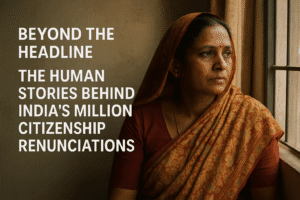Beyond the Headline: The Human Stories Behind India’s Million Citizenship Renunciations
Over 1 million Indians formally renounced citizenship between 2019-2024, a sustained trend exceeding 200,000 annually since 2022. This represents a profound, deliberate choice driven by diverse aspirations: access to global career opportunities, pursuit of advanced education abroad, and desires for different lifestyles or environments for families. India’s constitutional ban on dual citizenship forces a heartbreaking trade-off—full integration into new homes (across 135 countries) requires surrendering their birthright.
While the government cites “personal convenience,” the reality involves deep emotional ties severed alongside practical benefits gained. High-skilled professionals and families navigate a rigorous legal process, reflecting both India’s globally competitive talent and complex push-pull factors. This exodus underscores the difficult balance between individual dreams and national identity, leaving lingering questions about retention and connection to the homeland.
The vibrant diaspora networks and vital remittances highlight that bonds often endure beyond the passport.

The stark statistic is undeniable: over 1.04 million Indians chose to formally surrender their citizenship between 2019 and 2024. Ministry of External Affairs (MEA) data paints a picture of a significant, sustained trend, not a fleeting anomaly. But reducing this to mere numbers misses the profound human dimension. This isn’t just about passports; it’s about lives, aspirations, and complex choices echoing across the Indian diaspora.
The Scale of the Shift:
- Consistent High Volume: After a pandemic dip in 2020 (85,256), renunciations surged, consistently exceeding 200,000 annually since 2022. Peaking at 225,620 in 2022, the numbers remained high at 206,378 in 2024.
- A Longer Trend: Contextualizing this, MEA data shared earlier indicated approximately 1.75 million renunciations occurred between 2011 and mid-2023, highlighting this as a multi-decade phenomenon accelerating recently.
- Global Reach: Indians aren’t flocking to just a few destinations. Renunciations were made to gain citizenship in approximately 135 countries, ranging from global powerhouses (US, UK, Canada, Australia, Germany) to smaller nations (Antigua and Barbuda, Iceland, even the Vatican).
The “Why” Behind the Goodbye:
While the government officially attributes this to “personal convenience,” the reality is far more nuanced and deeply human:
- The Career Catalyst: For many highly skilled professionals (IT, engineering, finance, healthcare), opportunities abroad offer not just higher salaries, but often faster career progression, access to cutting-edge research, and perceived meritocratic systems less burdened by bureaucratic hurdles. The pursuit of global professional impact is a powerful driver.
- Education & Children’s Future: A significant number relocate for advanced degrees or post-doctoral research. Crucially, many who initially leave for work or study stay because they see clearer pathways to high-quality, often less competitive, education for their children abroad. The desire to secure perceived advantages for the next generation is a potent force.
- Quality of Life Considerations: This encompasses a broad spectrum: concerns about pollution in major cities, desire for better public infrastructure, access to different lifestyles (urban vibrancy vs. rural tranquility), perceived personal safety, or even simpler administrative processes. It’s about the daily lived experience.
- The Irrevocable Choice (The Dual Citizenship Barrier): India’s firm stance against dual citizenship (under Article 9 of the Constitution and the Citizenship Act, 1955) forces a stark, often painful, decision. For those building lives and families abroad over decades, integrating fully into their new society – including voting rights, property ownership ease, and unrestricted travel – necessitates relinquishing their Indian passport. This legal barrier turns integration into a permanent severance for many.
- The Millionaire Migration (A Shifting Subset): Reports like Henley’s highlight wealthy Indians relocating, though estimates suggest a decline in millionaire departures (5,100 projected in 2023, 4,300 in 2024, 3,500 in 2025). Their motivations often include global asset diversification, business expansion, estate planning in stable jurisdictions, or seeking specific lifestyle havens. This trend, while smaller, represents significant capital movement.
The Renunciation Process: A Deliberate Step
Surrendering citizenship isn’t impulsive. It’s a formal, multi-step process:
- Online Application: Initiated via the government portal (indiancitizenshiponline.nic.in).
- Document Verification: Rigorous checks by District Collectors (in India) or Consular Officers (abroad), including original passport inspection.
- Inter-Agency Scrutiny: The declaration undergoes a mandatory 30-day review by various Indian government agencies for potential objections (e.g., legal issues, pending dues).
- Certificate Issuance: Only after clearance is the Renunciation Certificate issued, formally ending Indian citizenship.
Beyond the Numbers: A Complex Reality
This trend isn’t inherently negative. It reflects:
- Global Mobility: India’s talent is internationally sought-after, a testament to its education system and workforce capabilities.
- Diaspora Strength: While no longer citizens, many who renounce maintain deep cultural and familial ties, contributing to India through remittances (a vital economic inflow), knowledge transfer, and advocacy.
- Personal Fulfillment: Individuals are pursuing life paths they believe offer greater opportunity or well-being for themselves and their families.
The Lingering Questions:
The data prompts deeper societal reflection:
- Retention vs. Attraction: What can be enhanced within India to retain its ambitious talent and attract global citizens, potentially including exploring forms of overseas citizenship that offer stronger ties without full dual status?
- Addressing Push Factors: While “personal convenience” is the official line, understanding the specific aspects of life abroad that are most attractive (or aspects in India perceived as hurdles) is crucial for informed policy discussions.
- The Emotional Cost: Behind each number is an individual or family making a profound, often bittersweet, choice to formally sever a core aspect of their identity tied to their homeland.
In Conclusion:
The million+ renunciations represent more than a statistical trend; they are a mosaic of individual dreams, difficult choices, and global opportunities colliding with India’s citizenship laws. It highlights the aspirations of a mobile population seeking their best future, often while retaining deep emotional connections to India. Understanding the complex human motivations behind the surrender certificates is essential to move beyond the headline and grasp the true significance of this ongoing demographic shift. It’s a story of global integration, personal ambition, and the enduring, yet changing, bonds of nationality.
You must be logged in to post a comment.